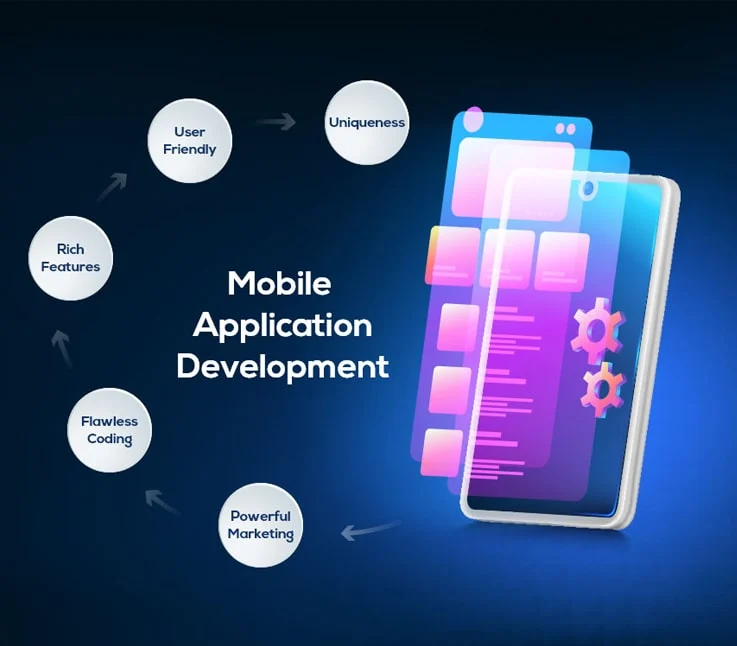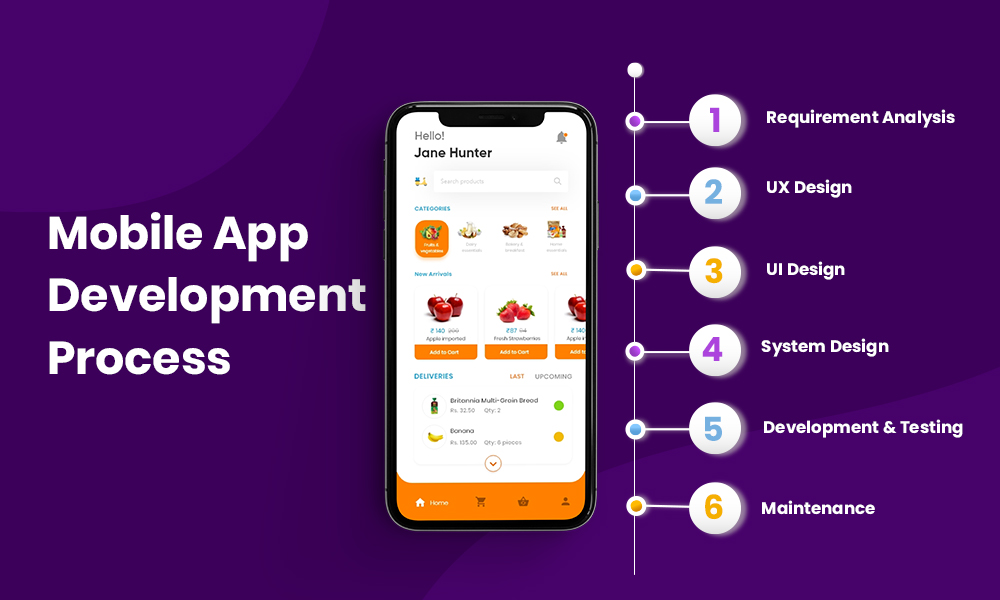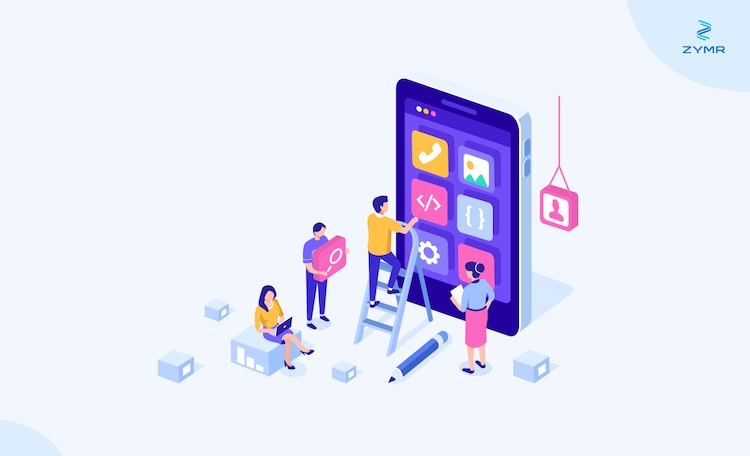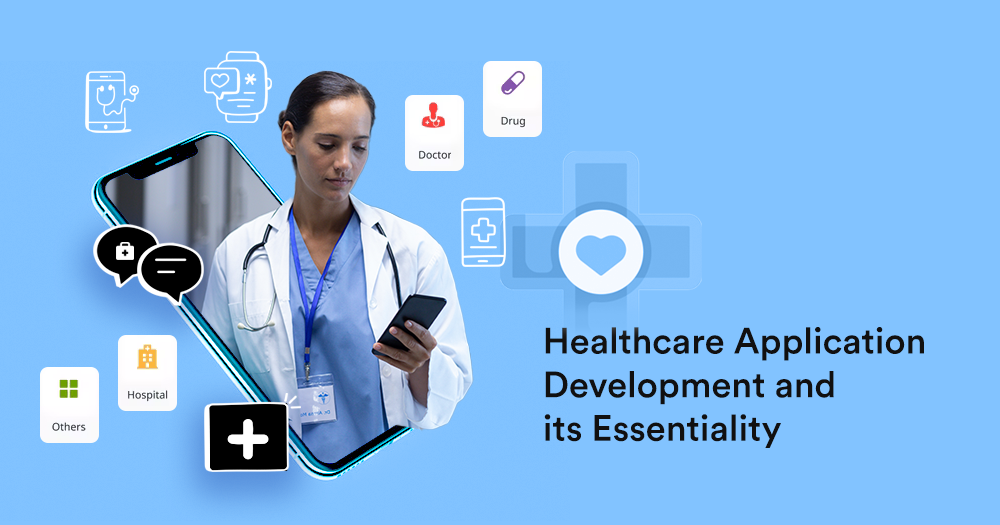A Complete Guide for Beginners and Businesses
Mobile app development are now a necessary component of our everyday lives in the fast-paced digital age we live in today. Mobile apps boost user experience, increase customer engagement, and boost revenue growth for companies, startups, and individuals alike. Success in developing a mobile application depends on your ability to comprehend the process and best practices.
Everything you need to know about mobile app development will be covered in this in-depth tutorial, from planning and designing to launching and maintaining a successful app.

What is Mobile App Development?
The process of developing apps for mobile platforms, like smartphones and tablets, is known as mobile app development. Also you can reach out custom software development companies for your custom mobile app development. These applications can be made for a variety of platforms, although they are mostly made for iOS (Apple) and Android (Google).
Three primary categories of mobile app development exist:
- Native apps: are created especially for a single platform utilizing programming languages such as Kotlin for Android and Swift for iOS.
- Hybrid applications: Web technologies like HTML, CSS, and JavaScript are used in the development of hybrid applications, which are natively containerized to run on several platforms.
- Progressive Web Apps (PWAs): Web-based programs that offer an app-like experience straight from a browser without the need for installation are known as Progressive Web Apps (PWAs).
Why is Mobile App Development Important?
Development of mobile apps is important for contemporary communication and business. This is why it’s crucial:
- Improves Customer Engagement: Through notifications, tailored content, and easy navigation, mobile apps offer a direct line of communication with users.
- Increases Business Revenue: Revenue is produced through monetization techniques like in-app purchases, ads, and subscriptions.
- Enhances User Experience: Compared to mobile webpages, apps provide a more engaging and intuitive user interface.
- Boosts Brand Recognition: A company’s exposure and reputation are increased by having a mobile app.
- Provides Competitive Advantage: Mobile apps help businesses remain ahead of the competition by providing ease and improved customer support.
Step-by-Step Mobile App Development Process
From conception to implementation and upkeep, there are various important phases involved in creating a Mobile App Development. Let’s examine the entire process of development.

1. Market Research
Conducting in-depth market research is essential prior to mobile app development. This entails assessing rivals, determining target consumers, and comprehending market trends. To make sure the app’s features and functionality satisfy user needs, surveys and consumer feedback are analyzed.
2. Choose the Right Development Approach
The objectives, financial constraints, and intended user base of your app will all influence the best course of action. The three primary methods consist of:
- Native Development: Perfect for apps that are platform-specific and performance-driven.
- Cross-Platform Development: Appropriate for using a single codebase to reach a larger audience (e.g., React Native, Flutter).
- No-Code/Low-Code Development: Helpful for straightforward apps that need to be deployed quickly and with no coding.
3. Design UI/UX
A mobile app’s user interface (UI) and user experience (UX) design are essential to its success. User-friendly interactions, aesthetically pleasing layouts, and intuitive navigation are all guaranteed by a well-structured design. Prior to development, wireframing and prototyping aid in visualizing the app’s appearance and feel.
4. Develop Your App
Writing code, adding functionality, and creating the app’s backend are all part of the development phase. Developers employ several technologies based on their methodology.
- iOS Development: Swift, Objective-C
- Android Development: Kotlin, Java
- Cross-Platform Development: React Native, Flutter
App functionality also depends heavily on backend services like databases, cloud storage, and authentication.
5. Testing and Debugging
To make sure the software works properly and is free of errors or security flaws, testing is crucial. Several testing techniques consist of:
- Functional Testing – Verifying the app’s core features work correctly.
- Performance Testing – Ensuring speed and responsiveness across devices.
- Security Testing – Identifying vulnerabilities and fixing potential threats.
- User Testing – Collecting real-user feedback to improve usability.
6. Launch and Marketing
In order to ensure compliance with their policies, the software must be published to the Google Play Store (Android) and Apple software Store (iOS) as soon as it is available. Marketing tactics including influencer collaborations, social media campaigns, SEO, and sponsored adverts increase downloads and draw in users.
7. Maintenance and Updates
An app’s long-term success depends on ongoing maintenance; releasing it is only the first step. To keep customers interested, regular updates add new features, improve security, and solve bugs. Compatibility and seamless operation are ensured by keeping up with operating system updates.
Technologies Used in Mobile App Development
Popular technologies for mobile app development include:
- Programming Languages: Swift, Kotlin, Java, Dart (Flutter)
- Frameworks: React Native, Flutter, Xamarin
- Backend Services: Firebase, Node.js, Django
- Databases: MySQL, MongoDB, PostgreSQL
- Cloud Platforms: AWS, Google Cloud, Microsoft Azure
Cost of Mobile App Development
The cost of developing a mobile app varies depending on complexity, features, and team expertise. Below is an estimated cost breakdown:
| Feature | Estimated Cost |
| Simple App | $5,000 – $20,000 |
| Medium Complexity App | $20,000 – $50,000 |
| Complex App | $50,000+ |
Factors influencing cost:
- App complexity and features
- Development platform (iOS, Android, or both)
- Third-party integrations (APIs, payment gateways, etc.)
- UI/UX design and animations
Future Trends in Mobile App Development
- Artificial Intelligence (AI): Apps with AI improve automation and customization.
- 5G Technology –Increased internet speed enhances the functionality of apps.
- Augmented Reality (AR) and Virtual Reality (VR) – Entering the gaming industry
- Wearable App Integration – Fitness applications and smartwatches are becoming more and more popular..
- Blockchain Security –improving data protection and app security.
Ready to Develop Your Mobile App?
If you’re ready to make your mobile app concept a reality, Macromodule Technologies can assist you. Our skilled development team specializes in creating mobile apps that are user-friendly, high-performing, and customized to meet your demands. To begin, get in touch with us right now!



